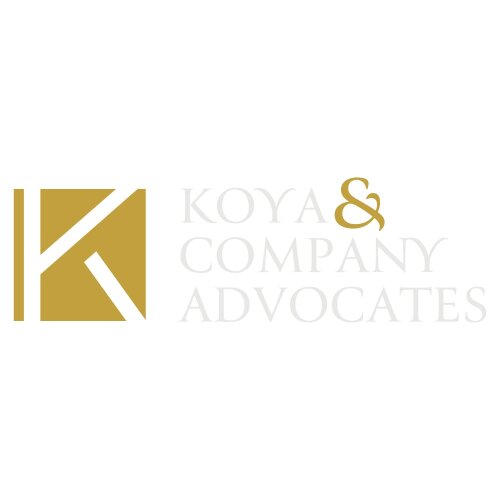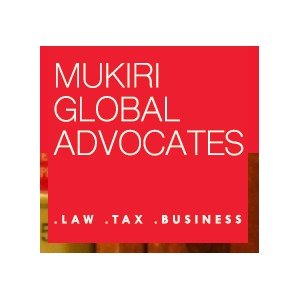Best ESG Advisory & Compliance Lawyers in Nairobi
Share your needs with us, get contacted by law firms.
Free. Takes 2 min.
List of the best lawyers in Nairobi, Kenya
Legal guides written by Adroit Law LLP:
- Kenya Launches Digital Nomad Visa: A Gateway for Remote Workers
- Navigating the Payment System License Maze in Kenya
- Navigating the Complexities of Mining Licenses and Permits in Kenya: A Look into Artisanal and Large-Scale Operations
About ESG Advisory & Compliance Law in Nairobi, Kenya
Environmental, Social, and Governance (ESG) Advisory and Compliance focuses on helping organizations operate responsibly and sustainably according to evolving standards. In Nairobi, Kenya, ESG is becoming increasingly significant as companies, investors, and regulators prioritize ethical business practices, environmental stewardship, and social responsibility. Legal advisory in this field assists businesses to understand and fulfill their obligations related to the environment, workforce rights, community impacts, and transparent governance. In Nairobi, both domestic and international entities must adhere to ESG frameworks as part of strategic risk management and competitive advantage.
Why You May Need a Lawyer
Legal assistance in ESG Advisory and Compliance may be required in a variety of circumstances, such as when a business is launching sustainability initiatives, seeking investment, or expanding operations. Common situations include:
- Ensuring compliance with environmental and labor laws
- Drafting or reviewing ESG policies and reports
- Conducting due diligence for mergers or acquisitions
- Responding to regulatory investigations or audits
- Addressing community or stakeholder concerns related to social and environmental impact
- Implementing sustainable supply chain practices
- Preparing for public listings, where ESG disclosures may be mandatory
- Engaging with financiers or investors who demand ESG compliance
- Managing risks and mitigating potential liabilities
In these circumstances, an experienced ESG lawyer can help navigate complex local and international regulations, ensuring that your business acts lawfully and responsibly.
Local Laws Overview
ESG Advisory and Compliance in Nairobi, Kenya, is shaped by several national laws and regulatory bodies, alongside international best practices. Key legal aspects include:
- Environmental Laws: The Environmental Management and Co-ordination Act (EMCA) is the main statute governing environmental protection, requiring businesses to conduct Environmental Impact Assessments (EIAs) and comply with regulations from the National Environment Management Authority (NEMA).
- Labor Laws: The Employment Act and the Occupational Safety and Health Act guide fair labor practices, health, and safety standards.
- Corporate Governance: The Companies Act and the Capital Markets Authority (CMA) require good governance practices, including transparency and anti-corruption measures.
- Social Responsibility: Businesses are expected to respect human rights as outlined in the Constitution, especially regarding local communities and indigenous peoples.
- Reporting Requirements: Listed companies must adhere to CMA guidelines on ESG disclosures in public filings and annual reports.
- Sustainable Finance: The Central Bank of Kenya encourages financial institutions to integrate ESG considerations in lending and investment decisions.
These frameworks aim to ensure companies balance profitability with responsibility to people, the planet, and ethical business practices.
Frequently Asked Questions
What does ESG mean for businesses in Kenya?
ESG stands for Environmental, Social, and Governance. It refers to the way businesses manage their environmental impact, their social responsibilities to employees and communities, and their internal governance structures. In Kenya, businesses are expected to incorporate ESG principles into their operations and decision-making processes.
Are there specific ESG laws in Kenya?
While there is no single ESG law, several Kenyan laws collectively address ESG concerns. These include environmental protection acts, labor regulations, corporate governance laws, and guidelines from regulatory authorities like the CMA and NEMA.
Is ESG compliance mandatory in Kenya?
Some ESG aspects are mandated by law, such as environmental assessments and labor protections. For listed companies, ESG disclosure is increasingly required by the Capital Markets Authority. Non-compliance can result in penalties, business restrictions, or reputational damage.
How do I know which ESG regulations apply to my business?
Applicable ESG regulations depend on your business sector, size, and location. An ESG lawyer can help identify the specific legal and regulatory requirements relevant to your business and guide on best practices.
What are the penalties for violating ESG-related laws?
Penalties vary depending on the nature of the violation. They may include fines, suspension of business licenses, court action, or compensation orders. Environmental and labor law breaches can attract particularly stringent sanctions.
How can a lawyer help me with ESG compliance?
A lawyer can conduct risk assessments, draft and implement compliance programs, advise on regulatory reporting, handle disputes, and represent you before authorities or courts if needed.
Are international ESG standards applicable in Kenya?
International ESG standards, such as those by the United Nations or the International Finance Corporation, are not legally binding but many businesses in Kenya voluntarily adopt them, especially if they seek international investment or business partners.
What is an Environmental Impact Assessment (EIA)?
An Environmental Impact Assessment is a process required by law for certain projects to evaluate and report the anticipated environmental effects before starting operations. Approval from NEMA is necessary before implementation.
How can I start creating an ESG policy for my business?
Start by identifying relevant ESG risks and opportunities, consulting applicable laws, and engaging stakeholders. A lawyer or ESG advisor can help you draft a policy that meets legal requirements and best practice standards.
Is ESG only relevant to large companies in Nairobi?
No, ESG principles apply to businesses of all sizes. While large, listed companies have more extensive reporting obligations, small and medium enterprises also benefit from improved risk management, investor confidence, and operational sustainability by embracing ESG.
Additional Resources
To assist with ESG Advisory and Compliance matters in Nairobi, Kenya, the following bodies and organizations are helpful:
- National Environment Management Authority (NEMA): Regulates and enforces environmental compliance, including EIAs.
- Capital Markets Authority (CMA): Issues guidelines on ESG disclosures for listed companies.
- Kenya Association of Manufacturers (KAM): Offers information on sustainability and environmental best practices.
- Law Society of Kenya (LSK): Directory of lawyers specializing in ESG and compliance matters.
- Ministry of Labour and Social Protection: Regulatory authority for workforce rights and social protections.
- Kenya Private Sector Alliance (KEPSA): Provides ESG advocacy and support for businesses.
Next Steps
If you believe your business requires legal advice or assistance with ESG Advisory and Compliance in Nairobi, Kenya, consider the following actions:
- Assess your current compliance status and identify potential ESG risks in your operations.
- Consult with a qualified lawyer or ESG advisor with experience in relevant local and international frameworks.
- Gather documentation such as business licenses, policies, and previous compliance or audit reports.
- Engage with regulatory authorities and industry organizations for guidance and support.
- Develop an action plan to address any gaps and implement robust ESG policies and reporting mechanisms.
Taking proactive steps with the support of legal experts ensures that your business not only meets its basic legal obligations but also positions itself as a responsible and forward-thinking organization in the evolving ESG landscape of Nairobi and Kenya at large.
Lawzana helps you find the best lawyers and law firms in Nairobi through a curated and pre-screened list of qualified legal professionals. Our platform offers rankings and detailed profiles of attorneys and law firms, allowing you to compare based on practice areas, including ESG Advisory & Compliance, experience, and client feedback.
Each profile includes a description of the firm's areas of practice, client reviews, team members and partners, year of establishment, spoken languages, office locations, contact information, social media presence, and any published articles or resources. Most firms on our platform speak English and are experienced in both local and international legal matters.
Get a quote from top-rated law firms in Nairobi, Kenya — quickly, securely, and without unnecessary hassle.
Disclaimer:
The information provided on this page is for general informational purposes only and does not constitute legal advice. While we strive to ensure the accuracy and relevance of the content, legal information may change over time, and interpretations of the law can vary. You should always consult with a qualified legal professional for advice specific to your situation.
We disclaim all liability for actions taken or not taken based on the content of this page. If you believe any information is incorrect or outdated, please contact us, and we will review and update it where appropriate.

















